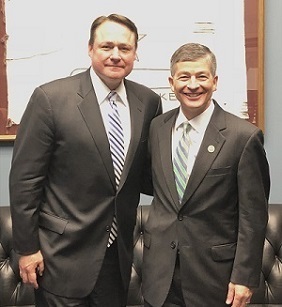Newsroom
NAFCU advocacy: 2018 wins set landscape for more

NAFCU's award-winning advocacy team maintains a constant presence on Capitol Hill, regularly meeting with administration officials, lawmakers and regulators to ensure credit unions' voices and concerns are heard. During the first 10 months of 2018, the association secured some major wins for the credit union industry that have set the landscape for even more as Congress enters into a new session.
A breakout of some of the biggest NAFCU and credit union wins so far this year can be found in the November-December edition of The NAFCU Journal. Here are a few to note:
- NAFCU witness Sonya McDonald testified before the House Small Business Committee in January on the importance of strengthening the Small Business Administration's (SBA) 7(a) loan program – a loan program widely used by credit unions to support their local communities. NAFCU-supported legislation to strengthen oversight of the program was signed into law in June and the association continues to work with the SBA to increase credit unions' participation in the agency's programs.
- NAFCU in February secured the credit union industry's first meeting with President Donald Trump at the White House, which was attended by NAFCU-member credit union CEOs. This meeting helped ensure the president's support of the NAFCU-backed Economic Growth, Regulatory Relief, and Consumer Protection Act (S. 2155), which was enacted in May. S. 2155 is the largest regulatory relief package to be enacted since the Dodd-Frank Act and includes a number a positive provisions for credit unions, including relief under the Home Mortgage Disclosure Act (HMDA) reporting requirements and member business lending exemptions. NAFCU will use S. 2155 as a building block for more relief on issues such as extended exam cycles and credit scoring.
- In June, NAFCU witness John Lewis testified before a House Financial Services subcommittee about the need for further guidance on regulators' risk-management expectations and suggested a safe harbor be put in place to ease credit unions' filing compliance burdens with Bank Secrecy Act (BSA) and anti-money laundering (AML) requirements. Lewis also shared concerns related to remittance requirements.
- NAFCU efforts also led House and Senate conferees to drop a provision in the fiscal year 2019 National Defense Authorization Act (NDAA) that would have required the Department of Defense (DoD) to allow all banks to operate rent free on military installations, disadvantaging credit unions.
- Last month, the NCUA Board approved a one-year delay of its risk-based capital (RBC) rule after NAFCU's advocacy for relief under the rule gained traction on Capitol Hill (the House passed a two-year delay provision three times). The association continues to work with Senate and House leaders to obtain a longer delay, arguing that the NCUA's delay "does not fully address all of the industry's concerns with the RBC rule."
- NAFCU continues to attend meetings and share credit unions' concerns related to the Financial Accounting Standards Board's (FASB) current expected credit loss (CECL) standard in order to obtain more guidance for the industry on the issue. FASB staff has indicated it is working on certain operational challenges, and the board is expected to finalize NAFCU-sought changes – including a delay in the standard's effective date for the industry – yet this year.
In addition, the association this year defended the credit union industry against bankers' attacks, urged banking regulators to withdraw a proposed rulemaking that would loosen Volcker rule requirements on big banks, and got Congress talking about enacting a modernized Glass-Steagall Act in order to protect consumers from banks that are still too big to fail. It also continues to defend credit unions facing meritless lawsuits related to unclear website accessibility requirements under the Americans with Disabilities Act (ADA) – NAFCU recently stood by one credit union as oral arguments were held by the U.S. Court of Appeals for the Fourth Circuit.
These legislative and regulatory wins – and NAFCU's ongoing advocacy efforts – have put credit unions in a strong position to see even more progress yet this year and in 2019 on a number of issues, including housing finance reform, data security, and BSA relief.
NAFCU will monitor and analyze today's elections results for their potential impact on credit unions (read more here).
Share This
Related Resources
Compliance Monitor - December 2018
Newsletter
Get daily updates.
Subscribe to NAFCU today.
